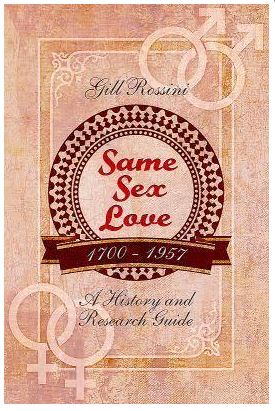 Rossini, Gill. Same Sex Love 1700-1957: A History and Research Guide. Pen & Sword History, 2017. 160 p. Paperback $19.95. ISBN 9781473854239.
Rossini, Gill. Same Sex Love 1700-1957: A History and Research Guide. Pen & Sword History, 2017. 160 p. Paperback $19.95. ISBN 9781473854239.
Specifically aimed at genealogists and family historians, Same Sex Love 1700-1957 contextualizes the types of information that may indicate that an ancestral family member or historical figure was involved in a same sex relationship. Broken into three large chapters that chronologically cover the 18th, 19th, and 20th century (until 1957), Gill Rossini explains the societal norms of British culture for that time, the various historical laws that criminalized sexual acts between men, and the contemporaneous attitudes towards homosexuality. The book’s extensive backmatter includes a 15-page “Research Guide to Same-Sex Relationships”.
In the introduction, Rossini acknowledges the ethical quandary of researching same-sex relationships and “outing” those who hid that part of their lives due to the very real dangers to their livelihood and well-being, and keeps the tone of the history respectful throughout. She attempts to document the lives of as many British people who are known to be involved in same sex relationships as possible. Those who were more well-known, such as authors Oscar Wilde and Radclyffe Hall, get more coverage due to the amount of information available about them. Those who were part of the working class, such as those found in the case studies of “Female Husbands” or attendees of the “Masked Ball of 1880 in Manchester”, are often only known because of arrests, trials, and newspaper articles dedicated to reporting on scandals. These historical records are recognized as a double-edged sword. “The historian gains knowledge, it could be said, at the expense of those who felt pain and humiliation at the time (p. 35).”
Originally published in Great Britain, this work is limited in its scope, as it covers only British figures and archival resources, but that limitation makes Rossini able to be thorough in her coverage. Also addressed in the introduction, Rossini deliberately did not assume the gender identity of any individuals, including those who cross-dressed or “passed” as another gender. This leads to her using pronouns and names that match the person’s birth identity instead of referring to them by any assumed names. The ending year in the title, 1957, was chosen as it was the year Parliament debated Wolfenden Report (written by the Departmental Committee on Homosexual Offenses and Prostitution). However, the report, which recommended decriminalization of homosexuality, was not acted on until the 1960s and the narrative of the book briefly remarks on several milestones of the 1960s before ending abruptly, making “1957” seem like an arbitrary date.
A very specific resource, Same Sex Love 1700-1957: A History and Research Guide is recommended for individuals and libraries with an interest in detailed LGBTQ historical research, or for large genealogically focused collections.
Kacy Helwick
Youth Collection Development Librarian
New Orleans Public Library